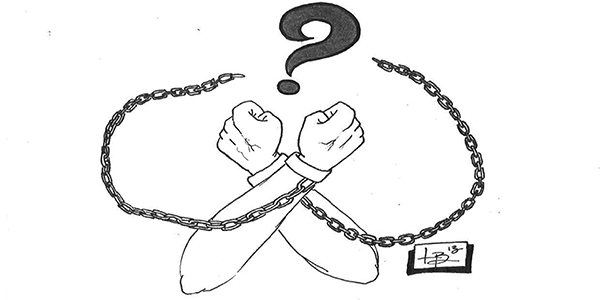I believe capital punishment should remain legal because there are eternal flaws in humanity that leads people to inevitably act in ways that should be punished. It may not sound pretty, but humans contain the potential for evil and wrongdoing that must be held to consequence somehow.
We don’t live in a perfect world, so why should we hold ourselves to an impossibly high utopian standard?
Killing people for their crimes may seem primitive and savage, but that is exactly what killing for any reason is- a harsh, carnal act that conflicts with mankind’s ethical standards. Some say violence begets more violence, but in what world should criminals be allowed to have a guarantee to life when they have taken that gift from others?
Firstly, the rhetoric of the Eighth Amendment of the U.S. Constitution should always remain in effect. This time-honored and crucial document ensures that such practices are never extreme or cruel. It is as much a safeguard for individuals to be protected from a tyrannical government as it is a necessary limitation of inhumane practices.
The use of death as ultimate punishment needs not be grotesquely entertaining, which is exactly why the Eighth Amendment should be continued and respected in conjunction with capital punishment.
For example, ancient practices for imposed death used to include crucifixion, burning at the stake and flaying (or peeling off the skin) while the prisoner was still alive. These practices are obviously cruel and sadistic, but even relatively recent methods like hanging and use of a firing squad are considered excessive.
One critical reason capital punishment should remain legal is moral in nature. If individuals feel they have the power to take life from others, they should be held to the same standard and be willing to give their own life in exchange. You take, and now you must give in return.
They have struck others down in cold blood and stolen their life without mercy. What gives them the right to be the guarantor of life or the reaper of death? Nothing does.
There are many instances which support capital punishment. One is the case of Richard Ramirez, the “Night Stalker” serial killer who violently murdered and raped his victims. Originally a Texas native, Ramirez moved to Southern California and began his reign of terror, going as far as gouging out and keeping the eyeballs of one of his victims. He also electrocuted a woman with an electrical cord, shot several people in the face at point-blank range, raped women so violently they were injured for life and killed a victim with a butcher knife.
Despite overwhelming evidence of Ramirez’s guilt and a whopping 19 death penalty rulings, Ramirez survived in prison until he died of natural causes in summer of 2013. He escaped death for more than two decades.
While men like Ramirez gain infamy for killing dozens of people, especially women, there are many more unknown individuals dwelling in prison cells for killing one or two people in cold blood, and still just as guilty and cold-hearted.
Taxpayers are forced to pay to keep death row inmates in prison for decades during court appeals and legal issues – all while they receive three square meals a day, medical care, their own bed and even access to forms of entertainment like TV and card games.
Why are we as taxpayers funding the support of convicted killers for years on end when a swift (and humane) death would save much time, money and grief of victims’ families?
A statement by the Justice Department’s Bureau of Justice Statistics estimates the 2012 population of U.S. prisons to be at 1,571,013 individuals. Yet of this massive amount, only 3,108 are on death row. How many of them have been in jail for a decade or more, waiting for a ruling that may never come?
It’s not a fun subject to talk about, but morally, we shouldn’t pay for those who selfishly and savagely kill others to receive better care than innocent and warm-hearted homeless people dwelling on our streets.
Our civilization needs justice, and true justice is swift, strong and unfaltering.
Capital punishment should remain legal and be used in extreme and appropriate cases.








